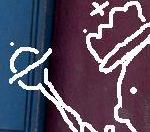[editor’s note 2018: jesus i was a fucking edgelord in 2011]
Bear with me. I put this off for a long time because it seemed like pissing into the wind. It seemed like the best way to go about writing was to throw all editing processes out and proceed with a gleeful abandon without due reflection on the morality of starting in the first place. I don’t know what that morality is. It’s mental exercise at the very least. Is there a better reason than that? I can’t help feeling that much of what succeeds in poetry (what do I mean by ‘succeeds’? I don’t know) is approved by and delivered to a very small group of humans. Why don’t more people enjoy poetry? Why does the idea of a bestselling poet (SH aside maybe) seem so bizarre? Does popularity matter? If poetry was a lush paradise of insight and emotional resonance enjoyed by the initiated few then its relative unpopularity would be tolerable. But so much is cold, flimsy posturing. Evoking and subsequently provoking a sense of wonder about the world is a challenging mission, one that has been conducted excellently and repeatedly in the past. But that was wonder about the world as it was. The mission for young poets is surely to stake a claim to a new way of thinking (easy, Ezra) about the world in poetic form not only as the world is, but what it will be. Poetry often feels like a poor cousin to other genres, not least due to its ponderousness, which seems to be unshakeable. Novelists, composers, modern artists and filmmakers constantly find new ways of exploring and exploiting their chosen forms, while poetry seems stuck on the same track since Robert (fucking) Creeley. Why the poor returns? There’s no simple answer, and of course there’s a huge argument against the question. But here I am and here you are so we may as well do some wild speculating. If it helps, try imagining my saying ‘to me, anyway’ after anything you find disagreeable.
It may be useful to know what I mean when I say ‘poem’ or bandy about shaky concepts like ‘true poems’ or ‘great poems’. It’ll be over before you know it. Deep breaths. With as little patience for categorisation as any reader, it seems like many poets don’t care about why the form exists in the first place. Some prominent writers (Robin Robertson springs to mind, as does our poet laureate) have so little interest in what impact form has on a poem they become trapped in their own voice and register, and reading an entire collection is a drag, like talking to one person for an entire New Year’s Eve party. For contrast, take Michael Donaghy and Paul Muldoon. They are tonally agile, capable of making the reader feel comfortable in an idea before pulling away the rug (which makes them sound rather vaudeville). More to the point, they use (often by rejecting) regular metre as a way of establishing a conceptual footing from which they build a network of possibilities. Perhaps there exists – I’m certainly aware of the tension in my own head – a distaste for formal writing as it connects with an anxiety about authority and restriction of freedom. But the poem itself, like any work of art, is its own restriction, simply by having a beginning and an ending, where the challenge is making the content outstrip and overflow the form. The challenge is finding a way to create, artificially and without prompting, a tension in one’s own work that justifies our putting pen to paper in the first place. Perhaps I lost you at ‘one’s’. So it goes.
How it sounds, and to a lesser extent how it looks. Poetry seems vastly in favour of work that has a fairly dim view of lineation and metrics. Sure, no great work flaunts its formal rigidity, but why shun it entirely? How many poems appear in how many magazines (print and otherwise) without any concern for sound? Why write a poem that could just as easily made its point as short prose? There is a roundly unconvincing argument that placement of words on a page affects how we read the line. So does punctuation, and throwing line breaks around seems like so much parlour trickery. Didn’t we make that point in the twenties? Though my argument is more general, it may help to have a specific straw man, and I happen to have in front of me the Forward Book of Poetry 2011, a decent barometer for today’s poetry. Although it is merely one amongst many Highly Recommended poems, here’s “Just Williams” by Tom Mathews:
This is just to say
That I have left William Carlos William’s [sic] poems
In the ice box.
Forgive me.
They were so sweet.
But so cold.
We can forgive him the typo as an editorial slip, but my god. That this made its way into a collection of the best work the country has to offer in an entire year shows an alarming irrelevance (imagine Russell Howard sincerely criticising a hollowness in the work of George Formby), and even then the joke is blown by the second bloody line. While we’re at it, no more ‘13 ways of looking at a blank’, please. Perhaps its inclusion points to the Forward Committee being worried about a certain humorlessness in their nominations, which would be understandable. The overriding impression from the book (with several noteworthy exceptions – Heaney, Morrisey, Copus) is a collection of good-natured but toothless protesters. I bring Derek Mahon up in the next paragraph because he is amongst the few who have an adequate command of their register to seamlessly lash a sense of humour to an emotional weightiness in the same poem. So few (CK Williams is also excused) seem capable of or interested in doing so that dedicated ‘funny’ poems (lord) become wearisome and joyless before the title is finished. I don’t accept any argument about confidence issues in writing poetry. How can you worry about reception when the audience is so small?
One of the things I’m pushing at is that so much of recent poetry seems to be afflicted with a nasty case of tin ear. One of the finest pieces (Mahon’s “Romance after Rimbaud”) is found in the Highly Commended section, despite being strides ahead of most of the Best Single Poem nominees, particularly the wishy-washy and club-footed Lee Sands. Mahon’s piece is weightier than it would have you believe, particularly when we consider the tension between the physical poet – Mahon aged 70 – and his chosen subject matter – Mahon aged 17. Can we get over this yet, by the way? Of course the poet isn’t exactly the same as the “I” in the poem. Of course we can get into a horrid mess if we assume that they are (cf Donaghy). But can we at least assume there was, at some point in the compositional process, a fully-engaged, emotionally complicated human behind the wheel? If – as Lydia Fulleylove does – we write about taking a car to a dying parent, should we not expect a little more from the poem than “my mother was dying and I was a bit flustered which made all my lines enjambed”?
Careful readers may have noticed a gap in the names I’ve been dropping throughout. Don Paterson is a great writer, and a magnificent manipulator of his lyrics. And they sound great. Let’s be clear on what I mean. Making a poem sound good is something like having the physical noise your words make follow your poem’s internal logic, then amplify it so that it registers an emotional impact that seems to come from nowhere. Sounding good is intensive work, with noticeably meagre returns. How many times have you approached a poet after a show and said ‘that sounded fab’? And yet it’s a non-negotiable part of the whole process. Making a knowledgeable and enlightening statement about life is hard enough, but making it sound good is what changes your act of reading out some sentences into a formal act of (my kingdom for a better word) poetry. Donaghy has written extensively and intensively about the impact of poetry on the memory, and I’ll direct you to him rather than paraphrase. But it’s the sound that makes you remember, and poetry is nothing if you forget it. That forgetting is so easy seems to be the disease at the heart of contemporary poetry.


